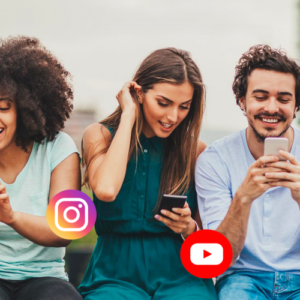How Gen Z Differs from Millennials & How to Target Them
In case you haven’t noticed, time has passed and there’s a new generation upon us; Gen Z. In the past all the marketing banter was focused on how to target millennials and while millennials are still extremely important, Gen Z is coming of age and on track to becoming the largest generation of consumers by 2020! So let’s take a look at how Gen Z is different from Millennials and some things to keep in mind when using social media to target products/services to this emerging generation.
Differences & Preferences in Social Media Use
Having almost been born smartphone in hand, Gen Z is the most tech savvy generation ever. But their behaviors and activity patterns on social media are distinctly different to the previous generation. Here’s how

Fun Content over Friends: While millennials used social media to update statuses and keep up with what their friends were up to, Gen Z uses social media more to fill up time and consume content. They are more likely to use it for entertainment than to stay connected. Interruptions by brands (aka ads) are not tolerated well and so it’s become essential that brands create content that cuts through noise and that Gen Z will want to watch, read and, more importantly, share. Creating original, innovative content is more important that creating content around a product
Fewer Platforms but More Time Spent on Each: Despite the growth of social media platforms, Gen Z is choosy about where they engage

where they engage and share their content. Gen Z spends longer on social media but uses way fewer platforms than millennials. Since they are looking for entertainment, YouTube is one of the most popular platforms for Gen Z. They’re also less likely to be on Facebook or Twitter and more likely to be on Instagram or Snapchat. They’re also very graphically oriented, preferring visual content over text based content so brands need to gear up for this.

Influencers more influential than brands: Influencer marketing will become more important as Gen Z comes of age. It’s become a popular marketing strategy and will only become more so. This generation is probably less trusting of brands than even millennials, who were already a difficult bunch. They prefer taking cues and inspiration from their favourite YouTubers, Instagrammers and other influencers because they feel it’s more genuine. Gen Z is less likely to follow brands on social media and less likely to visit brand pages than millennials,
Engaging with Gen Z: Things to Keep in Mind!
- Big on Social Responsibility – Since this is so important to this generation, brands will do well to align their missions and campaigns with something that resonates with their target audience at the time.

- Follow-able Profiles – Your profiles need to be engaging with excellent, quality content that’s preferably original and not just a thin veil for your marketing. Since this generation likes to engage so much, promotions and contests go a long way. Keeping ‘in trend’, as in speaking to the prevalent trend, is also super important. Use the filters they’re using and make full use of visual tools such as Instagram stories. Real-time marketing can play a huge role here.

- Mobile First – Gen Z are inseparable from their phones. This generation is most likely to access social media using a mobile device, most probably their phone. So marketers need to adopt a mobile first approach and ensure that all content can be easily consumed on a smartphone screen. Attention spans are also dwindling with Gen Z at 8 seconds compared to millennials at 12. So get to the point, quickly and with flare.

- Spending – Gen Z is more frugal than Millennials, not just in terms of money but also convenience and value. Things like free shipping and stuff tend to play well to Gen Z.

- Collaboration – Unlike Millennials, Gen Z usually doesn’t take well to collaborative exercises, preferring instead to work independently; they’re highly competitive.

- Expectations – Gen Z has higher expectations than previous generations. Millennials remember having to dial up to connect to the internet and other such ‘difficulties’ but Gen Z has had everything handed to them at high speed and with high tech. If you can’t deliver fast, they will think something is wrong.

- Tolerance – You’ll find that the new generation is less tolerant than the previous one. If they experience a technical hitch on a website, for example, they may never revisit that site.

As long as marketers are aware of the shifting fundamentals as the generational change goes into full swing, there is plenty of opportunity. In fact, it could be said that with Gen Z being the most connected generation, they could also become the most accessible generation ever for marketers. Only thing is that markets will have to change tunes and tactics to play to the likes and dislikes of this new and emerging generation.
Have you had experiences marketing to Gen Z? Are you Gen Z? Tell us in the comments section below.


